Just an article I pulled over from one of my old and now obsolete blogs.
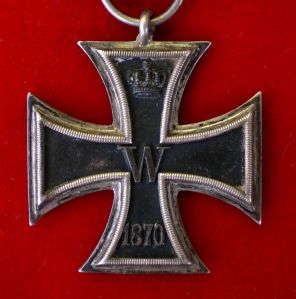 A couple of days ago I bought an old book on a flea market close to where I live. Its title is “Unsere Veteranen” (Our Veterans) and was published by a chapter of the Reichskriegerbund (Reichs Warrior Association) in 1914. Most interestingly for me the chapter was a local one. The veterans that were members of it lived in my town and the towns and villages around it.
A couple of days ago I bought an old book on a flea market close to where I live. Its title is “Unsere Veteranen” (Our Veterans) and was published by a chapter of the Reichskriegerbund (Reichs Warrior Association) in 1914. Most interestingly for me the chapter was a local one. The veterans that were members of it lived in my town and the towns and villages around it.
The book itself is special. Privately published by an association member it was meant to commemorate the 25thanniversary of the Kriegerbund and contains the tales of its members which fought in the wars of 1864, 1866 and 1870/71. According to the preface only 524 copies were printed, one for each veteran of these wars still alive in 1914.
It’s not in any library catalogue so I suppose the one I have here might easily be the only one remaining and it’s easy to tell why. It was very cheaply made. The binding has rotted away and the whole thing is falling to pieces.
What astounds me about these stories is their honesty. They lack a lot of the patriotic “With God for King and Fatherland” pathos which can be found in most period reports and writings. It’s clear that no one censored or proof read anything. The language is sometimes crude and the writing style is naive. The veterans wrote for their comrades. There was just no need to change anything. Facettes of the wars which you don’t find in the “popular” histories. Blood, Gore, cowardice, friendly fire, the harsh treatment of civilians, war against partisans.
HERMANN ANHUF
Hermann Anhuf in 1914 wearing his 1870/71 campaign medal and the 1897 centenary medal.
Unit: 12. Kompanie, Infanterie-Regiment “Graf Barfuß” (4. Westfälisches) Nr. 17
1870/71 – War against France / Battles and Sieges: (20. Inf.-Div., X. Armeekorps) 16.8.1870: Vionville-Mars la Tour, 18.8.1870: Gravelotte-St.Privat, 19.8.-27.10.1870: Siege of Metz, 23.9.1870 La Maxe, 27.9.1870: Bellevue & Franclonchamp, 7.10.1870: Bellevue, 3. u. 4.12.1870: Orléans (II. Batallion), 11.12.1870: Swequeu Château u. Mortais (II. Batallion), 15.12.1870: Vendôme, 16.12.1870: Vendôme, Tuilleries & Courtiras (II. Batallion), 17.12.1870: Epuisay (I. Batallion), 20.12.1870: Monnaie (I. u. F.), 28.u.29.12.1870 Château Renault, 31.12.1870: Vendôme, 31.12.1870: Danzé (9th and 12th company only), 1.1.1871: Azay (I.), 4.1.1871: Courtiras (II. Batallion), 6.1.1871: Azay-Mazange (I. and II. Batallion), 6.1.1871: Montoire-Les Roches, 9.1.1871: Chahaignes & Brives, 12.1.1871: Le Mans.
“When the war started I was serving with 12th coy of Infanterie-Regiment 17. We crossed the border into France in August as part of II. Armee, which was commanded by Prince Frederic Karl. On the 8th of August we left our luggage and backpacks behind to able to march faster, each man only keeping his 80 cartridges and the “Iron Ration”. The weather was hot but no one was allowed to drink! All wells were guarded by provosts as there were rumors that the french had poisoned them. On the 16th of August we marched towards the sound of the guns. On the 18th, near the village of St. Privat we were sent into action in support of the Guards. The enemy kept up a murderous fire and the Guards suffered severe losses, dead and maimed guardsmen lying everywhere. It was a ghastly sight.
I heard an officer calling “Forward now men of the 17th! On them! Charge!” and forward we charged towards the French. By then the whole village of St. Privat, including the church, was burning fiercely. Our Sergeant was hoping to get the Iron Cross and tried to lead our section into the attack on the left of the village where there was a huge open field, with no cover at all. When our Hauptmann noticed that he called out “Sergeant Albers, stop at once or I will have the men open fire on you!” So we rejoined the company very shortly afterwards.

On the 19th of August I noticed a small crowd of civilians and soldiers standing in a hollow close to our camp. I went to join them as I was curious about what was happening there. There were two women, about 30 years old and with their hands bound on their backs lying on the ground. Our lads were beating them with rifle butts. They were getting punished as they had been caught in the night after the battle when they were plundering some our wounded that were left lying on the field. One had even cut off the ring finger of a wounded soldier get his marriage ring. The other had mutilated the corpse of one of our officers. A while after the beating we shot them both.
On the 20th we marched through a ravine near Metz which was under siege. On the 27th we took part in the skirmish near La Maxe. During a rest near Les Grandes we were cleaning our rifles when our Hauptmann arrived and ordered us to reassemble them as the enemy was advancing on us. We were encamped in a large farmyard. Two platoons of our company were ordered to take defensive positions behind a wall while the third platoon took position outside the yard. Soon we could clearly see the french soldiers and opened fire. We fired until we had spent all of our ammunition, but luckily an ammunition cart arrived which enabled us to continue the fight. Our rifle barrels were red hot and it was getting hard to hold and aim the rifle at all. There were so many good targets that our Hauptmann ignored the order to leave the position and soon we began to get shelled by our own artillery. I can not put any blame on the gunners as they thought our position abandoned. The first shell missed us by about 50 meters. The next one went into some stables on our right. The third shell detonated right between the men of our platoon, killing two comrades and wounding another twelve.
After the fall of Metz I was ordered to escort a french prisoner, an artilleryman, to the POW camp. On the way there we encountered three stray sheep. I shoved the Frenchman into a ditch told him to bugger off home and herded the three sheep back to my company. The lads were more than happy. A good meat stew was far better than a single French prisoner! After we had slaughtered the sheep we traded the beasts intestines against some good bottles of wine in a nearby village. Stew and wine made this night the most memorable of the campaign.”
Hermann Anhuf

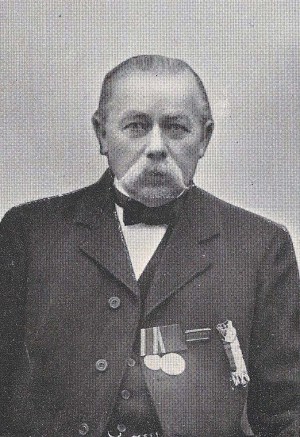
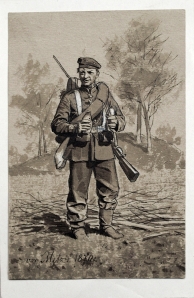

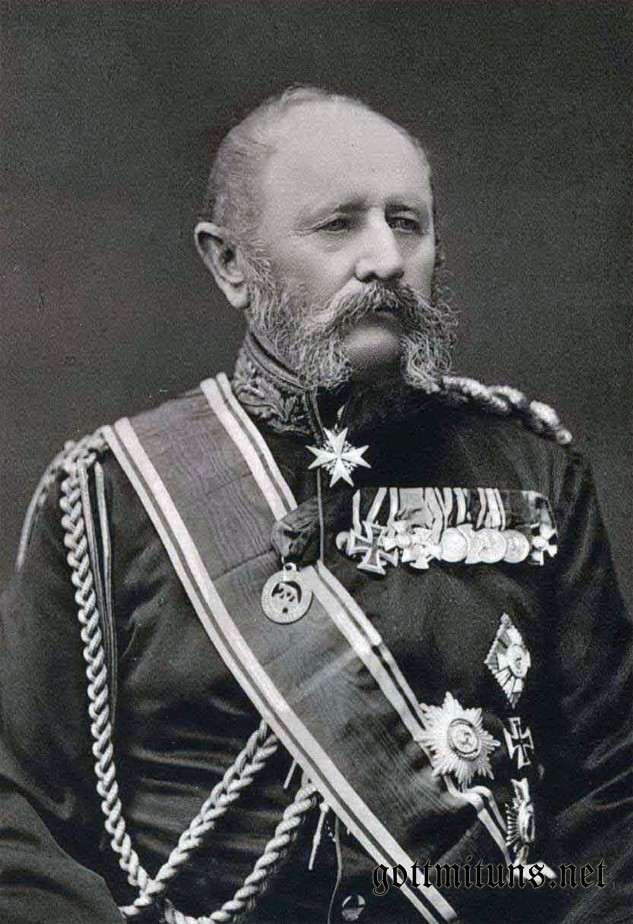
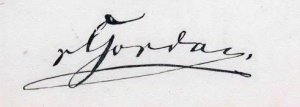 This impressive old gentleman is General Hellmuth von Gordon, General of the Prussian and later Imperial German Army and it is because of his family name I chose him to feature in this post. Hellmuth von Gordon was a direct descendant of the Scot John Gordon (the Gordons of Coldwells) who went to Poland as a merchant in 1716 as proved in a birth brieve dated to the 27th of June 1718 (a copy of which is found in the Aberdeen City Archives). One of his sons Joseph Gordon (later von Gordon), served as an officer in the army of Frederick the Great, rising to the rank of Oberstleutnant before getting raised into the Prussian nobility in Stargard in Oktober 1760.
This impressive old gentleman is General Hellmuth von Gordon, General of the Prussian and later Imperial German Army and it is because of his family name I chose him to feature in this post. Hellmuth von Gordon was a direct descendant of the Scot John Gordon (the Gordons of Coldwells) who went to Poland as a merchant in 1716 as proved in a birth brieve dated to the 27th of June 1718 (a copy of which is found in the Aberdeen City Archives). One of his sons Joseph Gordon (later von Gordon), served as an officer in the army of Frederick the Great, rising to the rank of Oberstleutnant before getting raised into the Prussian nobility in Stargard in Oktober 1760.